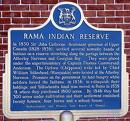Article published in Orillia's Packet & Times newspaper, on Saturday March 12, 2011:
Rama First Nation feeling the pinch
Rama First Nation is tightening its belt in hopes of weathering the global economic downturn that has now reached its doorstep, says Chief Sharon Stinson Henry. At a mandatory staff meeting held at the MASK arena in late February, Stinson Henry announced cost-saving measures all band employees would be required to follow. Vacation time will be capped, sick time reduced and cost-of-living raises abandoned. Stinson Henry said chief and council had led by example by taking a 10% pay cut. She also announced a "voluntary resignation program" for current employees where they could resign in exchange for three weeks of pay per year of service. "Everybody just sat there and nobody said anything," band member Jennifer Jewell said of the audience's reaction. "Where did our money go? It didn't really make any sense." Jewell, who works occasionally at the Gathering Place stores in Casino Rama, said staff were told the economy and Rama's loss of the 35% Casino Rama revenue case were to blame for the financial crunch.
Some band members would like to have more say
"What prompted it quite frankly was the downturn in the global economy that is affecting not only Rama First Nation but all governments at every level," Stinson Henry said Friday. The six-term chief also noted the loss of the 35% Casino Rama revenue case having a strong impact on Rama. A portion of the band's money comes from Casino Rama, a lucrative resort casino established on the reserve in 1996. In a 20-year agreement inked between Casino Rama and the Ontario Lottery and Gaming Corporation in January 2010, the Chippewas of Rama were allotted a 1.9% share of gross revenues from the casino starting August 2011.
In the first year of the new agreement, Rama First Nation's cut will be approximately $8.8 million, up from $5.8 million under the old arrangement. But in July 2010, Rama's appeal to the Supreme Court of Canada to receive 35% of Casino Rama's revenue in perpetuity was denied, meaning $180 million held in escrow was released to other First Nations. Cheryle Snache, who manages Rama's food bank, said the root of the problem goes beyond the economy and the 35% casino revenue loss. "I think that they've always had the attitude that the pot was never going to run dry," Snache said. Expensive salaries, bad investments, costly severance packages, travel expenses, and even clothing allowances are the problem, she said. "All those things, I think, are unnecessary," Snache said. "I don't think that kind of stuff should happen. We need to be investing in the community needs." Both Jewell and Snache would like better communication between chief and council and band members on financial issues. Jewell said they do receive financial updates regularly, but there is little opportunity for discussion on solutions. "I think communication always plays a good role in solving problems. Better communication, not just one way where we're getting information - we want to be involved," she said. Chief and council do hold semi-annual financial reporting meetings where they present audited financial statements to their members, Stinson Henry noted. The next meeting will take place in April. Snache agrees that community members should have more say in possible cost-saving measures. "On- and off-(reserve) members have good ideas on what we should be doing with our money, but we're not listened to. Maybe if we had been listened to, things would have been different." Feedback from the February staff meeting has been good, Stinson Henry said, adding that the response for the voluntary resignation program has been very positive. She could not say how many people applied for the buyout. "Rama is in a good position. We're just being fiscally responsible here looking into the future," she said.



